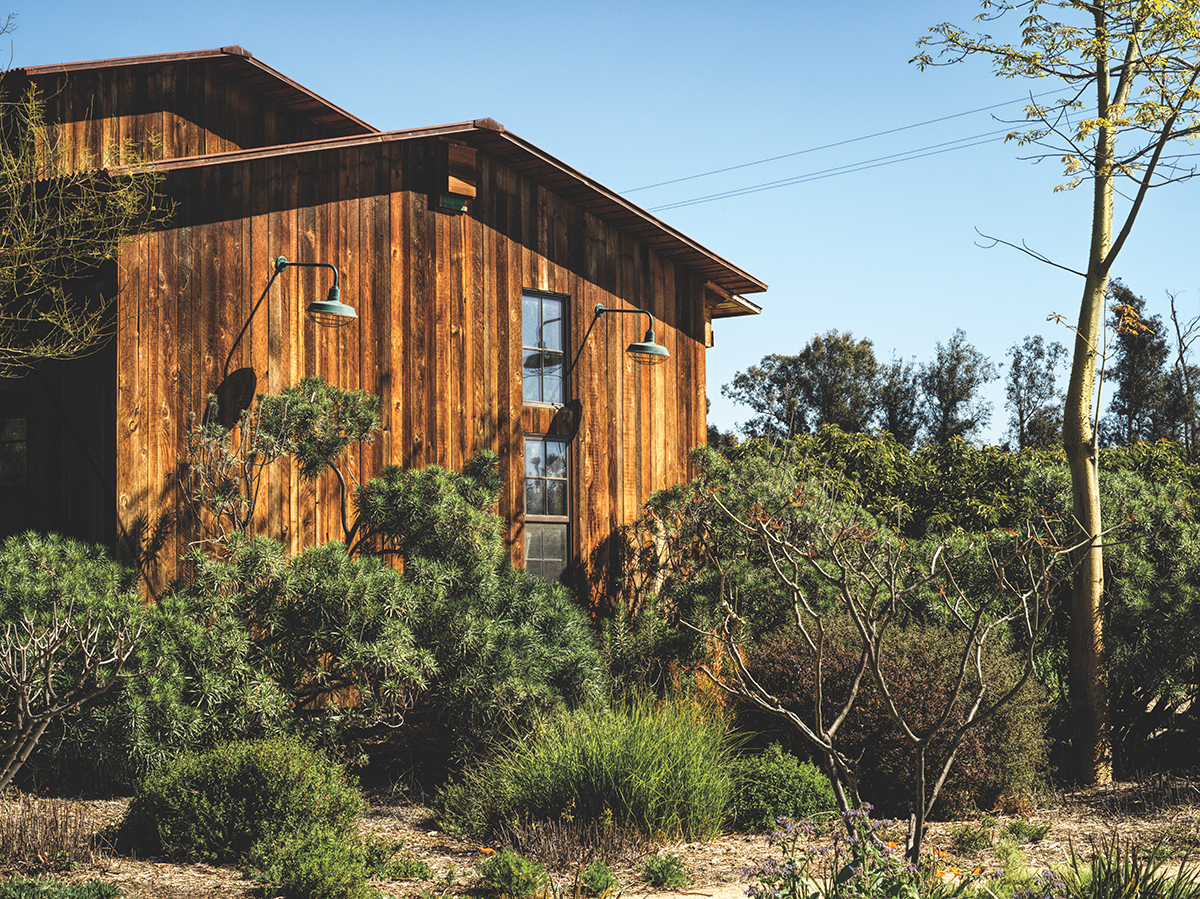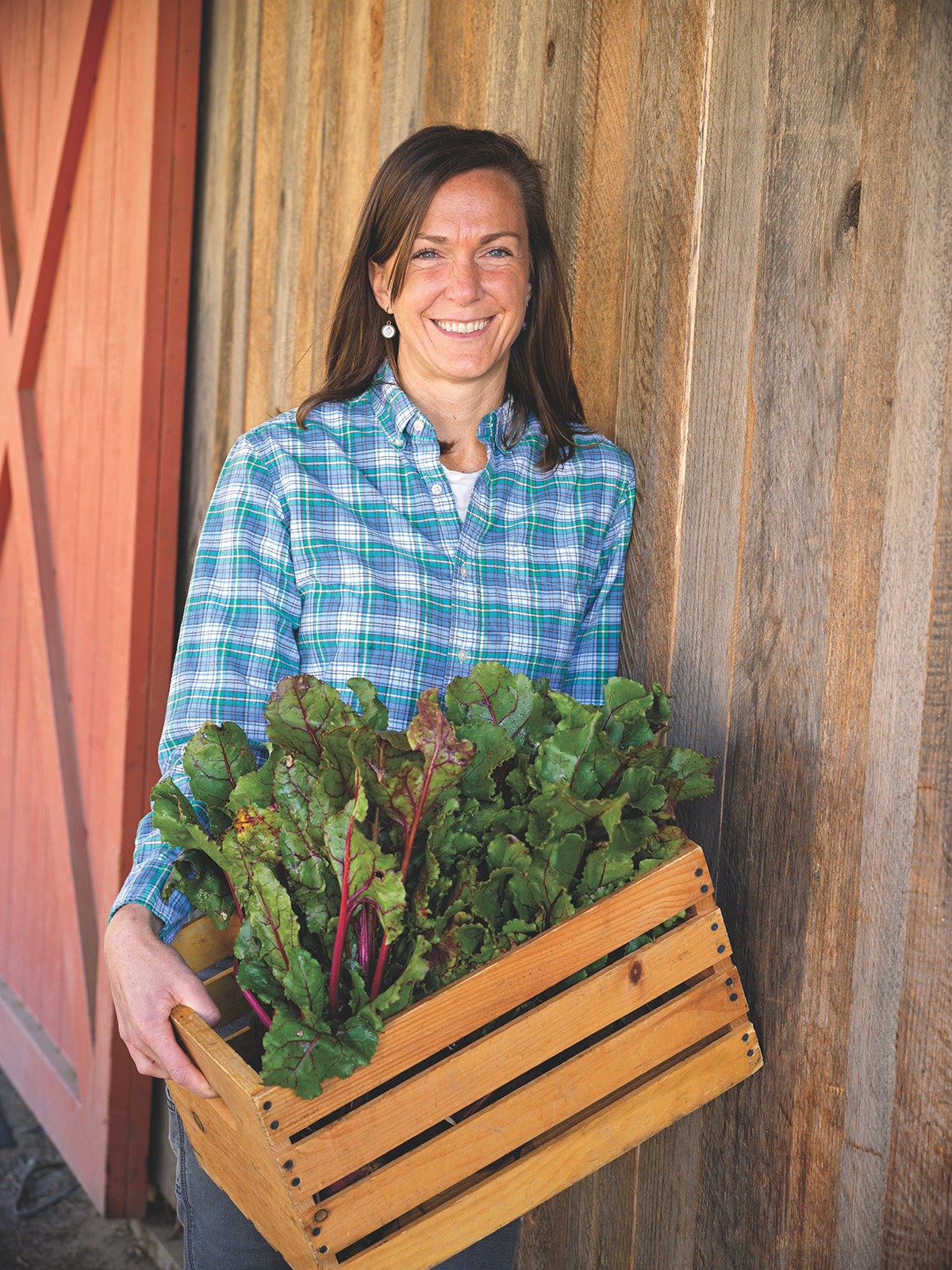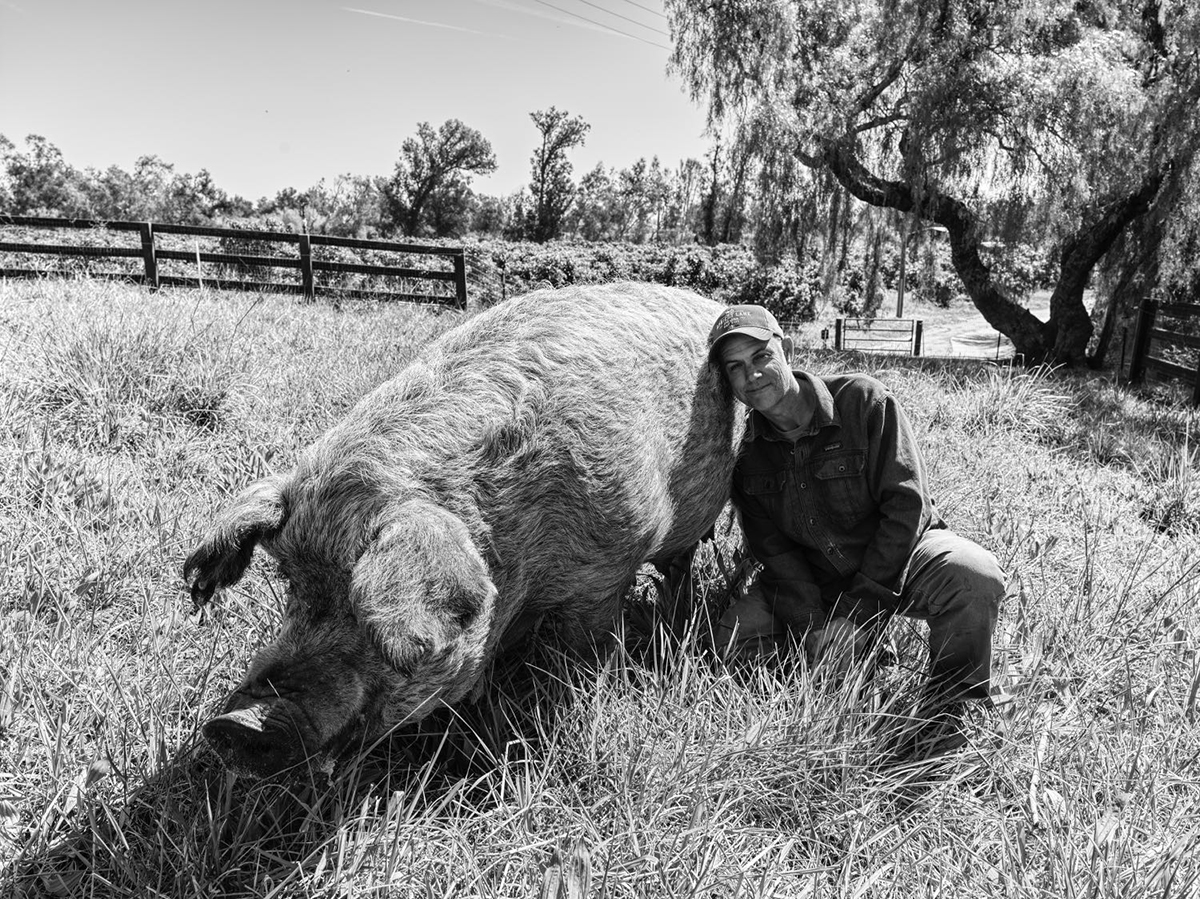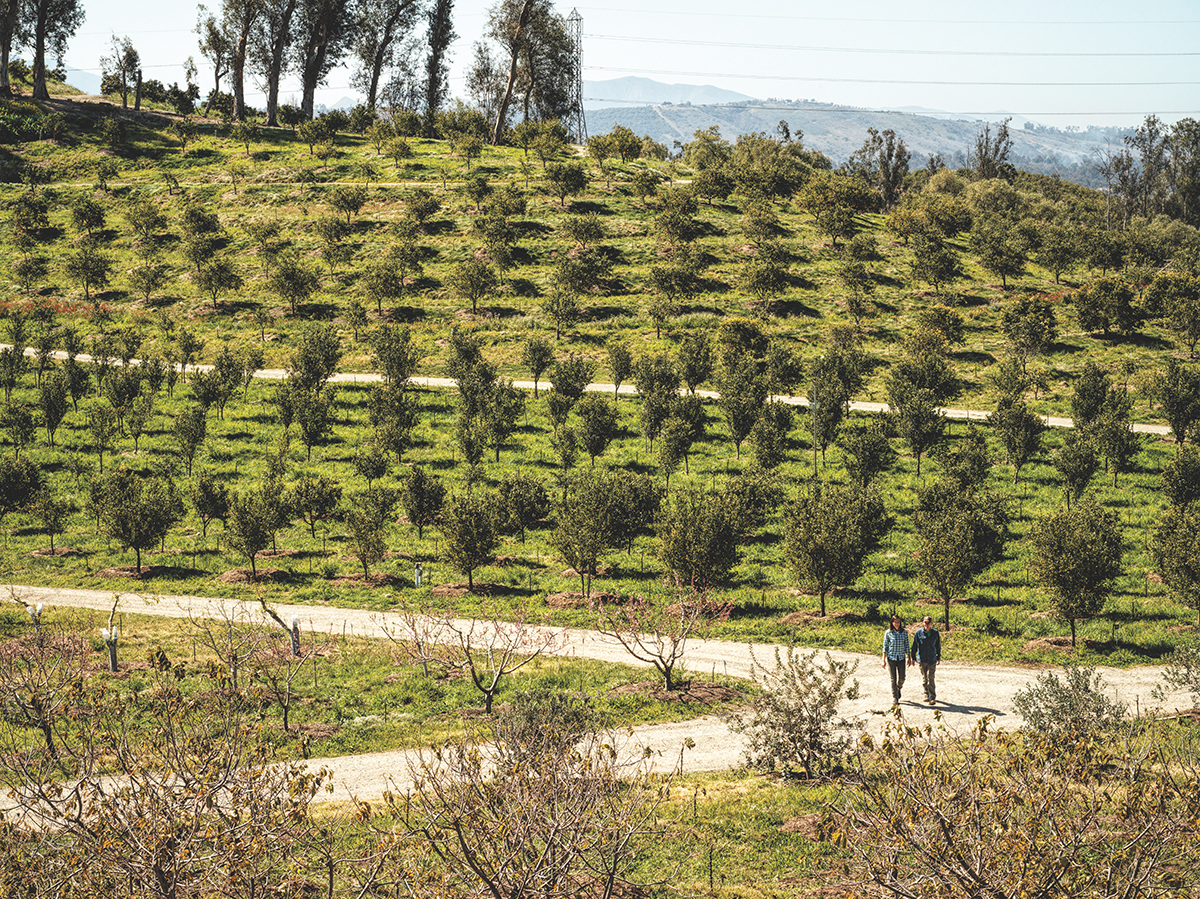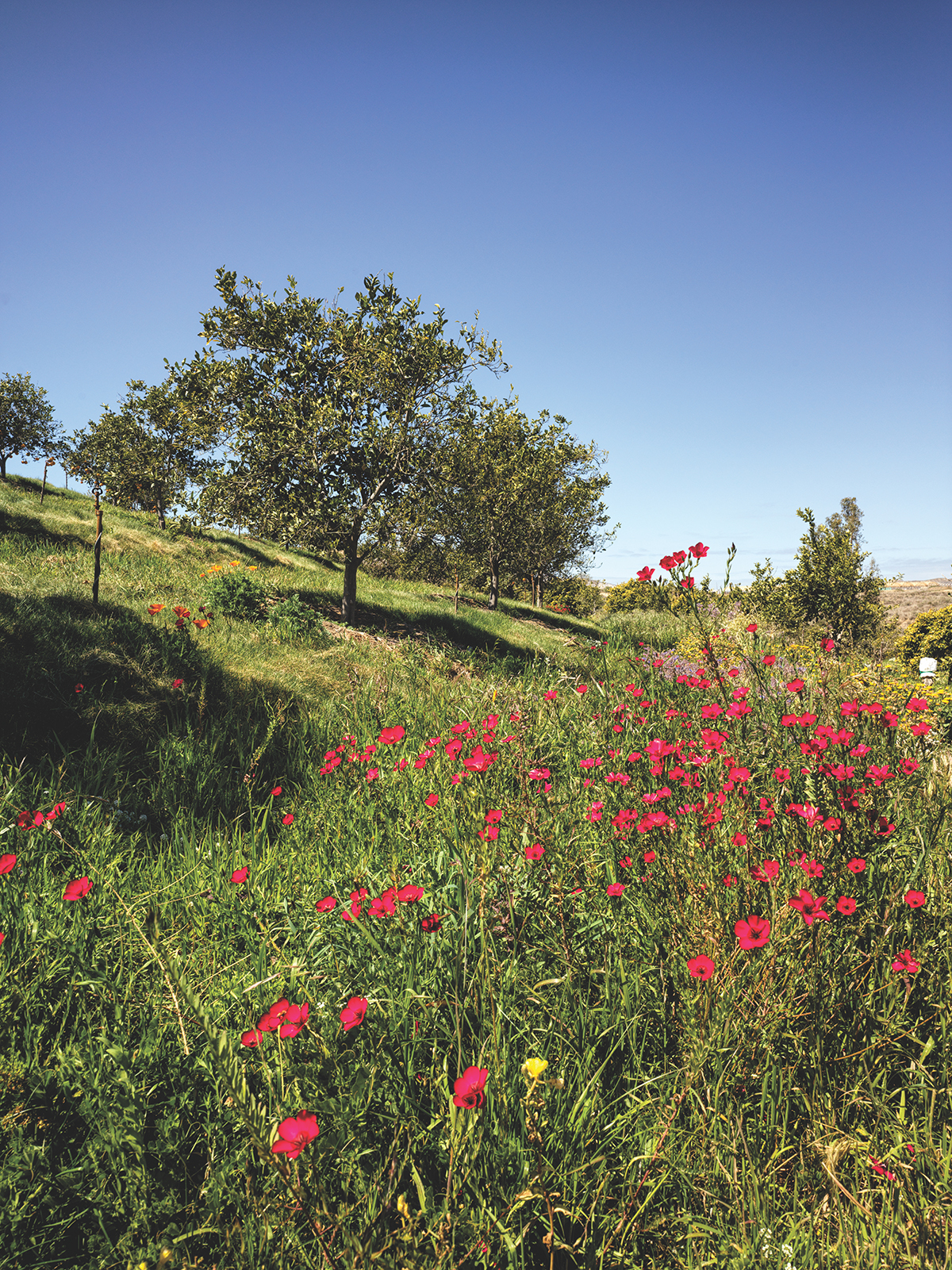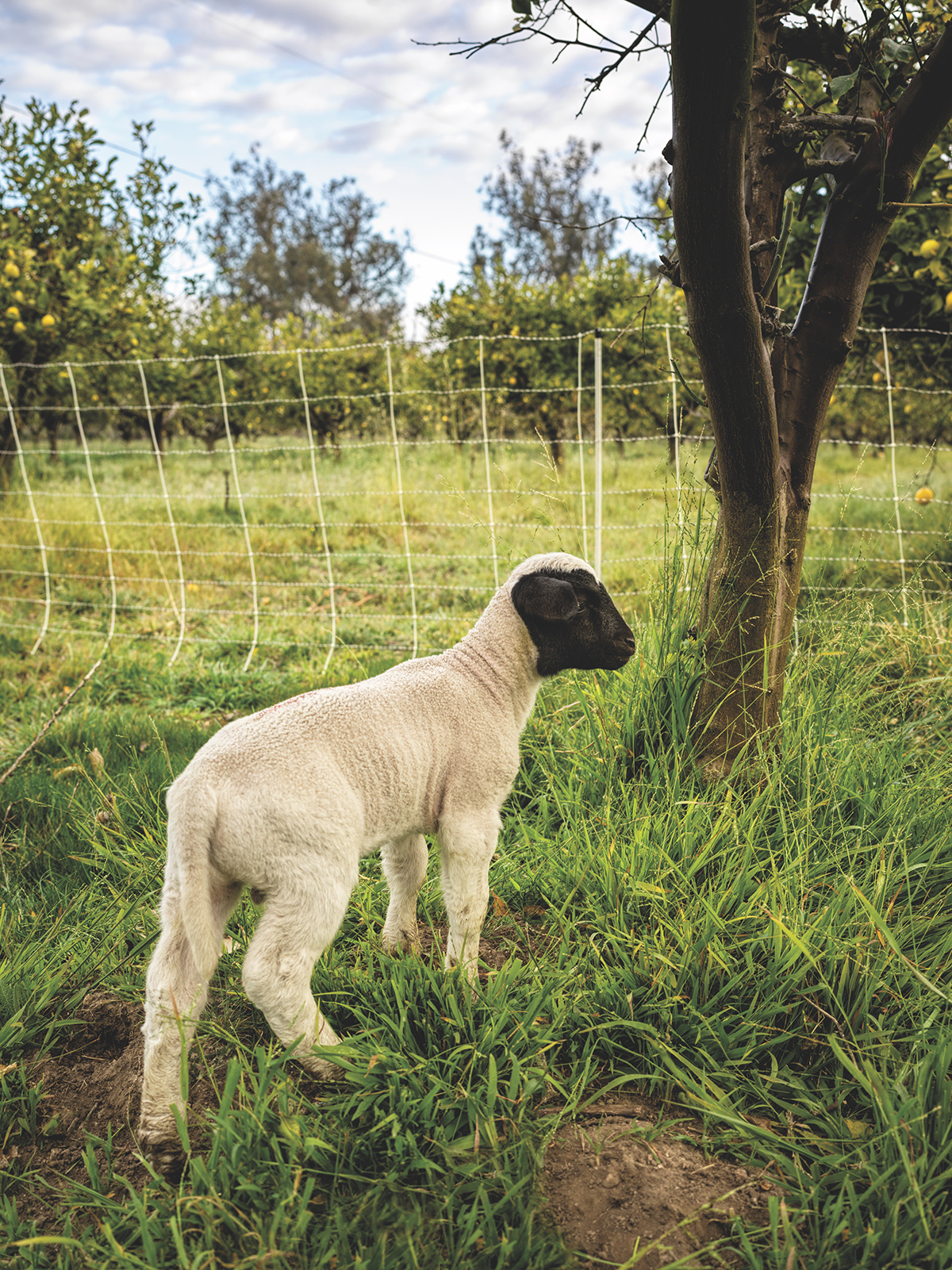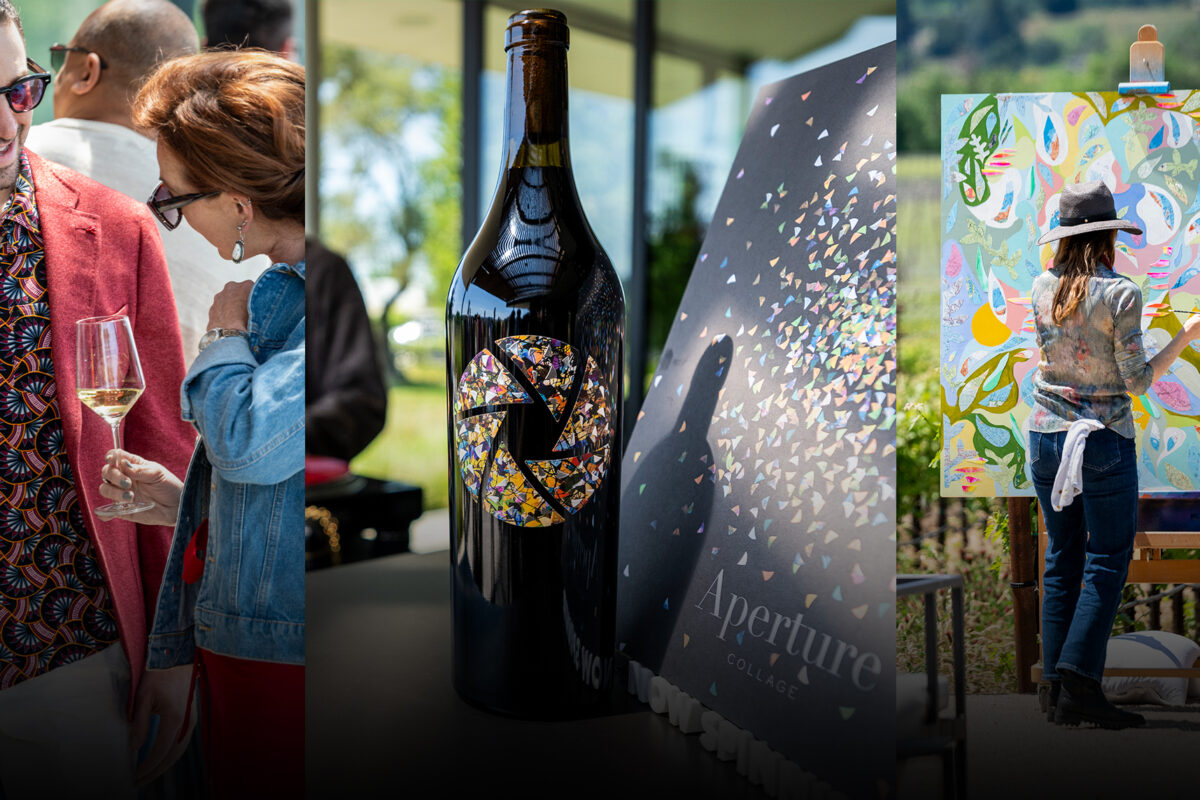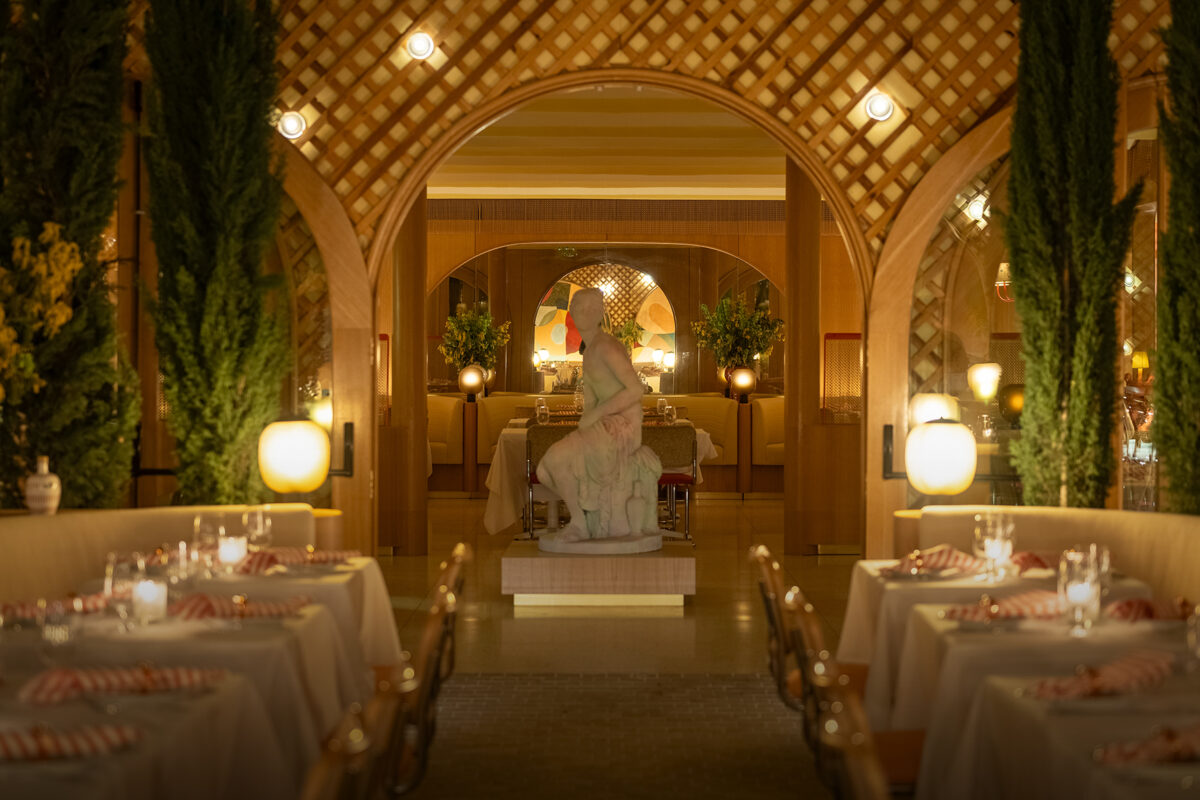For John and Molly Chester, who quit city life 10 years ago to set a new standard in sustainable produce, pandemic popularity via a heart-warming documentary was just a by-product of their farming revolution
Words by HELENA DE BERTODANO
Photography by RAINER HOSCH
A tragedy appears to be unfolding when I arrive at Apricot Lane Farms. A 1-day old lamb — a triplet born in a rainstorm the previous night — is at death’s door and John Chester is trying to save him. “Are you with me? Oh God, he’s so weak. Hang in there, buddy,” he pleads, cradling the hypothermic lamb while trying to insert a tube of colostrum into its mouth.
The Garden Barn is the central hub for operations for the 2.1-acre market garden.
After an hour of trying different approaches — colostrum, milk, dextrose, a lamp for warmth — the lamb remains barely responsive. “Those are all the tricks I’ve got,” sighs John, placing the lamb gently into a wooden box and covering it with his jacket. He leaves the lamb in the care of two farmhands, preparing them for the worst. “This might not work out. And it’s really hard.”
There is never a dull moment at Apricot Lane Farms. Which is why John, a documentary maker turned farmer, was able to make such an engaging film about his quest with his wife Molly to turn 214 acres of exhausted land northwest of Los Angeles into a regenerative, organic, biodynamic farm. The Biggest Little Farm is a visually stunning, very personal tale of endurance and fulfillment, and was short-listed for a best documentary Oscar last year.
MOLLY CHESTER with some Swiss chard.
Now John is filming a new series which will be released by a “major” streamer in 2024, although he can’t say which: “It will pick up where the movie left off: focusing more on wildlife animals than on us.” One episode, for example, will center on George, the egret who used to eat minnows from the pond but has now helpfully switched to gophers, the farm’s most prolific pests. “He swallows them whole. He’s a gopher-eating harpooning maniac,” says John.
JOHN CHESTER and Emma the pig.
This April marked the 10th anniversary of the couple’s move from their tiny apartment in a Santa Monica complex, with its fire-escape garden. “We didn’t have two pennies to rub together,” says Molly, 42, who worked as a private chef for Hollywood actors. They had rescued a retriever/border collie mix, Todd, whose barking led to their eviction — igniting a long-held dream. With the help of a financial backer, they bought a neglected avocado and lemon farm outside Moorpark. Todd was ecstatic, John and Molly slightly wary: “We were both nervous but wanted to give it a try,” says Molly.
Rose, one of four Great Pyrenees guardian dogs.
Todd is now buried under a tree, and they have Blue, a white golden retriever, as well as six guardian dogs which help look after the sheep. They also have a son, Beauden, who is six. And their farm is literally a dream come true, an earthly utopia you have to see to believe.
John, 49, takes me on a tour in a buggy. It is storybook pretty: brown cows graze on verdant hills, lambs gambol through lemon groves, stone-fruit trees are bursting into blossom, citrus trees groan under the weight of lemons, oranges and kumquats. “We call this The Fruit Basket,” says John, plucking a Fukushu kumquat: “You don’t have to grow 80 varieties of trees and have every single animal represented, but the more you can add that complexity, the higher the level of biological diversity.”
John and Molly Chester take a stroll by The Fruit Basket orchard.
The couple’s first task was to change the composition of the soil: “When you taste a real heirloom-variety apple grown in really good soil, you taste the mineralization of the appley flavor,” says John. Meat and eggs taste better too, harvested from livestock that feeds on grass grown in that rich soil.
His enthusiasm is infectious, and you can see why Gwyneth Paltrow jokingly asked him to be her “spiritual teacher” on a recent Goop podcast: he sounds almost evangelistic. Vaulting over a fence into a cow pasture, he drops to his knees and scrabbles together a handful of soil. “Smell it. Put your nose right into it.” It smells sweet and damp. “The only alchemizer of death back into life exists right here beneath our feet.” He points to the sky, then back to earth: “This is how it works. This is how it has always worked. … You are a leather bag of nutrients sourced from dead kittens and woolly mammoths, and the soil is only waiting for you to come back.”
Three Akaushi cows — a Japanese Wagyu breed — of the 25-strong herd graze on the hillside of the 214-acre Apricot Lane Farms.
On that cheerful note, we continue up the hill and stop at another breathtaking view, the Pacific Ocean twinkling 30 miles away in the distance. “At 1 o’clock the breeze starts coming from the ocean and cools everything off.” He points out a house on a neighboring hill, once their home and now a school for their son and eight other children whose parents are local or work on the farm. The Chesters have moved to a newly constructed larger Spanish-style villa.
Their customers are “people who connect their personal health to the food choices they make,” says John. He describes the eggs as “the gateway drug” into Apricot Lane Farms produce. A dozen eggs may cost $15, but they sell out within minutes of the stalls opening at markets in Santa Monica, Thousand Oaks, Calabasas and Mar Vista. It takes me a couple of trips to markets before I manage to land a box — but they’re worth the effort. Rich with golden yolks, they make other eggs pale, literally, in comparison. And everything else currently in season — fennel, spinach, carrots, avocados — tastes like a sweeter, truer version of itself.
Wildflowers litter the property.
The couple arrived at the farm with little experience. “I thought I had experience, that’s the worst part,” says John. “In my teens and 20s I worked on corn and soy farms in Maryland. I drove a tractor and built fences, but I didn’t understand soil. I dumped 40 tons of raw manure in a tomato field here once, I didn’t know it had to be composted.” He chuckles: “It’s all right: those tomatoes didn’t go to market but they were insane — the best goddamn tomatoes ever.”
“I have a therapist, a couples therapist and a business coach. I need it all”
MOLLY CHESTER
We pass a field where a few black pigs are snouting through the soil. John whistles and shouts: “You guys are not supposed to be there! You know it too. That’s hilarious: look at the way they’re looking at me like ‘grrrrrrr.’”
His personification of the animals is part of the charm. Emma the pig and Greasy the rooster were two of the stars of The Biggest Little Farm. But the documentary doesn’t sugarcoat the experience, concentrating as much on the epic struggle the couple faced — against predators, the elements, disease and death. Disasters come thick and fast; even their chief adviser Alan York, a pioneer in biodynamic farming, dies of cancer. California’s worst drought in centuries delivers another blow. And then come the wildfires, which threaten to destroy everything.
A South African Dorper lamb.
At times, the strain has overwhelmed them. John describes having nightmares of a sideways tornado hurtling straight toward him. Do they do therapy? “Oh my gosh, yes!” exclaims Molly. “I have a therapist, John has a therapist. We also have a couple therapist. I have a business coach. I need it all.”
Starting from three staff, they now employ up to 75 people depending on the season, including several in media and film. Stable stalls have been converted into production offices. “I do voice-overs in here,” says John, opening a shed door. “It used to be a birthing stall for horses.” Mostly self-sufficient, they shop for extras at Erewhon or farmers markets. “We buy milk unless Maggie [the cow] is milking,” says Molly. “And we buy salami, cheese and broccoli.” Meanwhile Molly is compiling a book of recipes that follow what she describes as a seasonal, ancestral approach to cooking — an extension of her connection with nature and the farm’s ecosystem, using culinary techniques such as soaking, sprouting, souring and fermenting.
The coronavirus barely halted their stride. “We treated it very seriously,” explains John, “and our farmers-market team was really innovative and became a role model in sanitation, so our food sales got better. People who really wanted to stay healthy wanted this food.”
Their neighbors, whose land starts “where it gets brown over there,” were dumbfounded. “They think we’re crazy and say we’re never going to feed the world with this way of farming. At first I was like, ‘Holy shit, they’re right, we’ll never feed the world like this.’ It took me a few years to realize this whole love-the-planet thing is a complete …” He struggles for the right word. “I mean, I like the idea of the planet. But do you love a girl in Kansas you’ve never met? I have not met the whole planet. What is wrong with first feeding your family, feeding your community? I’m not trying to save the world. I’m trying to save my piece of property. And guess what: that’s enough.”
Today one small lamb, the 28th born this season, is the beneficiary of that focus. Walking back into the barn, we hear a healthy bleating. But the wooden box is empty. “He’s disappeared!” exclaims John, alarmed. A search ensues and the lamb is found in the bathroom, peeing beside the toilet. “That’s an A for effort,” John chuckles.
A young chick.
Molly, who has a quieter energy, says they haven’t changed so much as “become.” “I didn’t even understand myself until I figured out I was a farmer. I used to wonder: ‘Why are my hands so big?’” She says their newfound fame has not altered them. “Didn’t Oprah once say it depends when fame hits: before or after you knew who you were? We already knew what was important. So it just enables us to continue to do what we believe is important.”
If they had known how grueling the last decade would be, would they have embarked on the project? John looks pensive. “If someone said, ‘You’re going to experience a plane crash, the wings are gonna fall off and you’ll be isolated on an island making decisions about life and death,’ you probably would say no. But if I could have seen us now, then hell yes. But you’ve got to get me to the end.”
“Would I go through it again?” asks Molly. “In a heartbeat. The love for this farm is really just the love of life.” apricotlanefarms.com.
Feature Image: On the western perimeter of the property runs Lemon Pepper Lane.
This story originally appeared in the Summer 2021 issue of C Magazine.
Discover more FOOD news.

